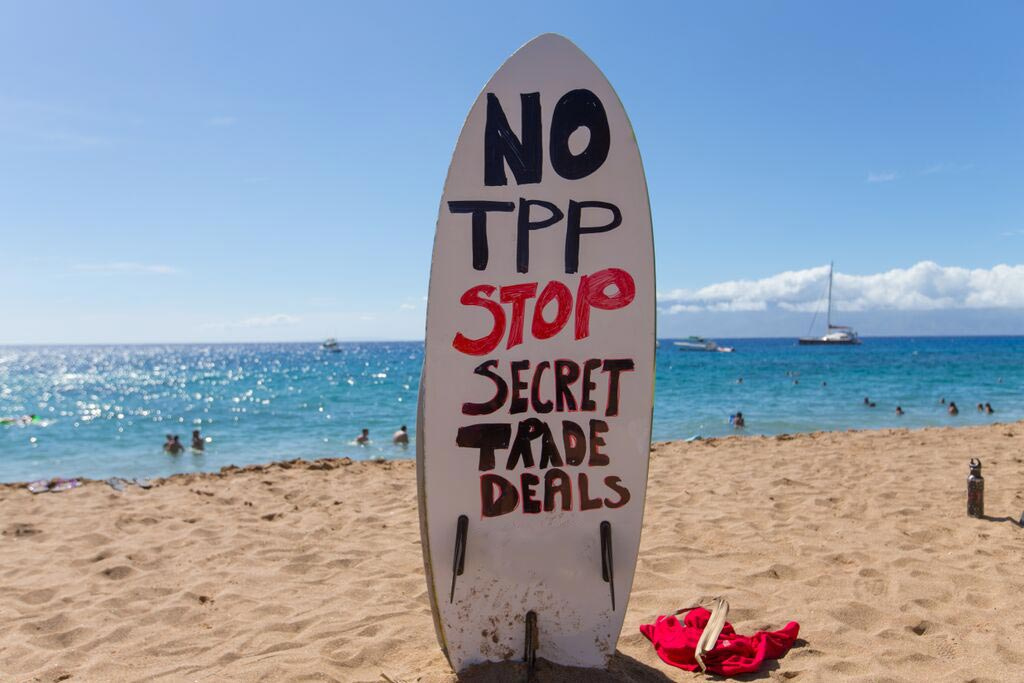Originally published at MintPress News.
AUSTIN, Texas — A new year brings new challenges and new opportunities for the international movement opposed to the Trans-Pacific Partnership, a controversial trade deal that activists say threatens to allow corporate power to overrule democracy.
Despite widespread opposition and controversy, President Barack Obama and other world leaders are expected to sign the agreement in Auckland, New Zealand, in early February, according to a Jan. 12 report from the New Zealand Herald.
Opposition to the TPP comes from many fronts. There are concerns about how the deal undermines food safety, the local food movement and consumer rights, as well as its potentially devastating effects on intellectual property laws and the price of prescription drugs.
The signing seems likely to transpire with relatively little fanfare for a deal with such far-reaching impact. The announcement of the actual date expected to occur with as little warning as possible, reflecting how unpopular this global trade deal has become. Kevin Zeese, an organizer with Popular Resistance, a website which encourages activism against corporate influence over politics, told MintPress News, “They are not making [the date] definite because they worry protesters will show up.”
Whether or not protesters travel to Auckland, resistance to the TPP is expected to continue into the foreseeable future. Zeese, who also contributes to MintPress, elaborated on what will happen after the signing takes place:
Obama can submit implementing legislation at anytime after that. Once he does, the 90-day fast-track clock begins. The House has up to 60 days to vote and the Senate gets an additional 30 days. He could submit implementing legislation whenever he likes on Feb. 5 or Nov. 5, or leave it to the next president.
Congress approved “fast-track” authority for the TPP deal on June 24, meaning that the trade deal can only be voted on as a whole, with legislators unable to propose amendments to the text. Zeese explained that swaying Congress members against the TPP will be a key focus for activists in the coming months:
The key issue is: Does he have the votes? Our job is to make sure he never has the votes — that is how these agreements are defeated.
Zeese added that there is considerable debate between the White House and Congress over when the bill should be introduced:
Senate Majority Leader Mitch McConnell has said that Obama should wait till after the election and submit it either during the lame duck period or wait till the next president and let him or her renegotiate some key portions. … Obama says the deal could fall apart if they take that route.
Vicki Needham, writing on Dec. 10 for Washington news site The Hill, noted:
McConnell isn’t the only Senate Republican throwing a wrench into the works.
Senate Finance Committee Chairman Orrin Hatch (R-Utah), who helped craft the fast-track legislation, has raised major concerns about the deal, especially for the TPP’s protections for high-tech medicines called biologics. Pharmaceutical companies pushed for the U.S. standard of 12 years of data protections but got eight.
Concerned about their own re-elections, Needham reported that even supportive Democrats have said “there is a small window within the first three months of the year where they would feel comfortable voting for the TPP.”
Lori Wallach, writing at Popular Resistance, noted that Obama only mentioned the TPP for 28 seconds during his Jan. 12 State of the Union address, and that mention didn’t come until 40 minutes into the speech.
“Obama’s unexpectedly brief mention of the TPP may simply reflect that the pact is very unpopular across the political spectrum and talking about it more only makes opposition grow,” Wallach wrote.
